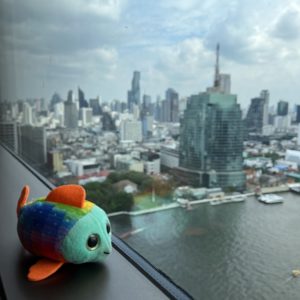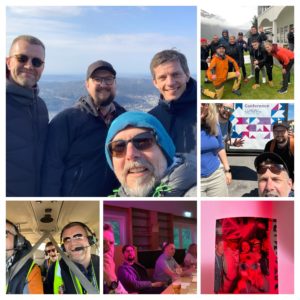Publishing a rough draft- links and images to follow: In the last couple of years I have emceed at a few WordCamps. Not many, but they have been pretty large ones. As someone who works in WordPress and really values the broad open source community around the software, but whose day to day work doesn’t really lend itself to presenting technology or business insights to a wider audience, this tends to be my main opportunity to give back to the community. Besides, I really enjoy it, and it does mean I get to look like I’m involved, even if (to be honest) the actual amount of work involved is far less than the people presenting.
The WordCamps I have been involved in lately have been WCEU (Vienna and Paris, the latter just 2 days hence), WC London (2016 and 2017), and WC Brighton (2016 and hopefully 2017). These vary in scale – WCEU is usually one of the two biggest WordCamps in any year (insert comment about ridiculous ‘biggest WordCamp arms race’ here). WC Brighton is perhaps typical of smaller (and in 2016 younger) WordCamps around the world. And WC London falls somewhere in between. If I’m honest I think WC London is the perfect wordcamp – the venue has its quirks sure, but scale wise it’s brilliant, and there really is something for everyone, and it’s not so big that you couldn’t see or meet just about everyone you want to if you put your mind to it. But I digress.
Emceeing (or MCing, or compèreing) can make a real difference at a conference. If you get it wrong, it isn’t the end of the world, and to be honest you can still do a cracking job, and stuff can still go wrong enough elsewhere to make your best efforts make not much of a difference. However, done right, and with good support (which *is* something you can make happen) an Emcee can make things awesome.
The number one objective of the Emcee is to make everyone in the room feel happy, confident, and not under stress – in other words, comfortable to engage. That means both the speaker/presenter, and the audience. This is important because if these people are happy, confident, and not stressed, then the speaker will do a better talk, the audience will engage more and take more in, and the overall experience of both with leave a lasting positive impression. Stress kills a presenter. Stress makes an audience less open to a presentation. Stress is something that you, as the Emcee, are in the best possible position to deal with.
Actually that’s not quite true about the number one objective – safety is number one, but the point above is so important that I put it up there anyway. Safety is the absolute top priority – you need to keep your audience and speakers safe. The obvious way to deliver this is with good, clear, confident housekeeping remarks. Regular updates from the events team are good to include as well. So, in order to deliver these, confidently, you need a really strong communications channel with your event organiser. You must make it clear that you need a single point of contact – a key authority figure. And they need a deputy you can turn to if they’re incapacitated. This specification of roles who you’re working with *is* your responsibility. Grip it, and you can be completely confident and happy that you’re passing on good clear info.
By all means be fun in how you share safety information – the ‘airline steward’ model of pointing out the emergency exits is a lovely time served trope, and has the added advantage of making the audience feel they are all traveling together (which, in a manner of speaking, they are). For some of them they may have flown recently, so it chimes back to recent experiences. ‘In the event of landing on water..’ can get a laugh too.
Another note on safety – WordCamps all have codes of conduct and they are largely much of a muchness. Know your code of conduct. Ensure you stay within its guidelines. And also remind the audience that the code is there, and how they can use it to deal with problems. It’s not just about ensuring no one acts in a way that’s harmful, but that they also know how to report issues.
So how might it work? Well it needs to be your approach, as in genuinely authentically you as host. Imagine the room is yours, but the time and space and event is yours _and_ the audience’s. Your’s together. So, make them welcome, thank them for being there, reassure them that you’ll keep them safe, and let them know that together, you and they, are going to make the speakers really welcome.
Introducing speakers is the second big bit of the emcee gig. Know your speakers. Read their bios, follow them on twitter, meet them at the speakers dinner, hangout. What I aim for is being able to reassure the audience that I can, genuinely, personally, vouch that this is a great speaker. To be honest, the best way to do that is to be pretty close to the organising team and as soon as the speakers are selected you can strike up a rapport. Even if you leave it later though your can still get in touch. Even the day before it’s so worth making contact.
Things you can do in preparation with the speaker include talking to them about what the key points they’d like to get across in their presentation. A lot of the time this is what they wrote in their outline, but it might not be. As the presentation approaches they might like to emphasise some other angle. This will help them think about their presentation, and also get the audience ready to pay attention to these key aspects. Improving everyone’s confidence.
You can also prep questions for the Q&A – knowing some key areas that the speaker would like to explore further in questions can help you segue into the questions. And if the audience hasn’t got questions you can punt a good one yourself.
I like to top and tail my sessions – give them a sense of occasion. Thank your audience for making the session. Give them a sense of ownership of the occasion, and invite them to connect with all the speakers and yourself afterwards. To be honest I usually need a bit of a break after a session (it *is* exhausting and draining and wipes you out if you’ve done it right), but it’s also a great way to make yourself known to a lot of people and encourage further discussion.
Enjoy. Dance, sing, be silly. Have fun.







Recent Comments